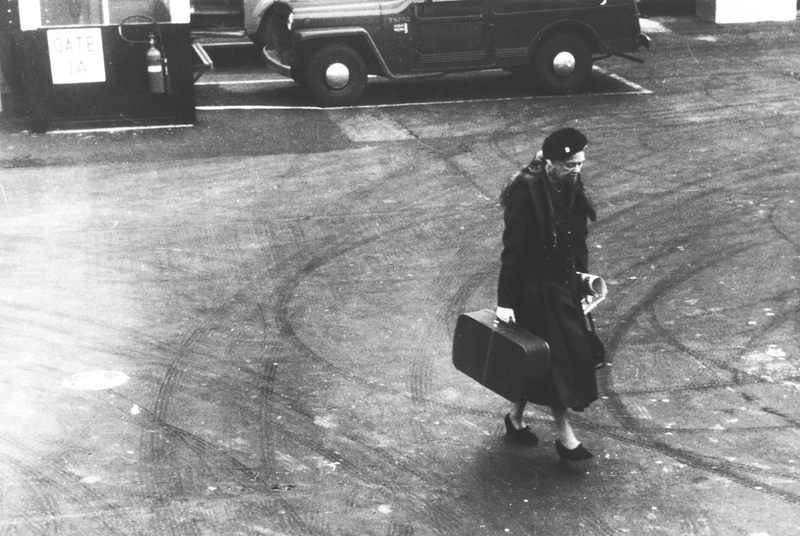Eleanor Roosevelt's Trip to Russia

"All I can do is tell you how it looked to me," the former First Lady tells her audience in this charmingly plain-spoken account of her 1957 visit to the Soviet Union. Neither a dupe nor a mindless booster, she provides a clear-eyed picture of what she saw. Although she wasn't treated as a VIP, going through the regular Intourist Agency rather than applying to the more elite Exchange Committee, she realizes she was shown the best the country has to offer. "We do the same," she points out, when entertaining foreign guests. Her argument for understanding the Soviet people's tolerance for what, to us, would seem terrible deprivations, both material and of civil liberties, is the extreme youth of the new state, only forty years old, and the awful conditions Russians suffered under the Czars. Her opinions are uncensored and unvarnished. Of the building boom, "They have completely sacrificed beauty and quality to speed." As for the Jews, despite Khrushchev's assurances, she is quite sure they are "having their culture wiped out." She is particularly interested in childcare, which is mandatory, and the situation of young mothers in general. While she dutifully reports that her bags were probably searched and that she was no doubt watched, she also points out how our own McCarran-Walter Act has led to similar suspicion and xenophobia here.
Also included is the text of a letter written to the New York Times from "a Leningrad housewife" and Mrs. Roosevelt's public response. The letter is either the well-intentioned sentiments of a Soviet citizen or manufactured propaganda. It's hard to say. It excoriates America for arming West Germany and conducting A-bomb tests. Mrs. Roosevelt's measured answer is at pains to explain that the information the woman has been receiving may not be completely objective. She points out that, like the author, she has five children herself, and that the vast majority of Americans do not want war. In the end, rather typically, she invites her to come visit. This country has had few more decent-hearted ambassadors than Eleanor Roosevelt.
To fully appreciate the tightrope Roosevelt was walking here it is important to understand the political atmosphere of the time. Eleanor Roosevelt was always seen as being "to the left" of her husband. After his death and the start of the Cold War she was viewed by many with suspicion. As the website First Ladies explains:
Having no illusions about the human cost of the communist system, Eleanor Roosevelt viewed Soviet and Eastern European leaders and their intentions with a jaundiced eye, but believed strongly that continuing dialogue with them was vital. Opponents of this view often cast her throughout the 1950’s as a secret communist, or at least sympathetic to the socialism, charges she had encountered as First Lady. She was a leading and, at times, lone voice of concern about civil liberties as Senator Joseph McCarthy conducted his hearings seeking out those who might have communist sympathies within the government.
It's instructive to turn to Roosevelt's own newspaper column, My Day, where she goes deeper into some of the points she raises in this radio talk.
We must remember that the vast number of Soviet people have been peasants, have lived in huts in overcrowded conditions with no sanitation and other comforts, without medical care, without education and that religion was largely used to make these poor conditions of life accepted—a panacea to keep people quiet and make them think of a future life rather than of the miserable present. So it is natural that the present government stresses for the mass of people the possibilities of education, the giving of medical care, the security of a job and an old-age pension, even though it asks for sacrifices and offers comparatively slow progress in the more modern comforts of living….It seems to me that this situation calls for understanding on our part, respect for these achievements, but a firmer belief in the possibilities of our own system.
Such even-handed treatment was not the norm in the Fifties, when everyone was taking sides. Russia was either held to be the template for an inevitable global workers revolution or as a hideous totalitarian state holding its populace in slavery. As the Eleanor Roosevelt Papers Project at George Washington University points out:
ER's columns, however, clearly attempt to show her American readers the humanity of the average Soviet citizen. She wrote extensively about the individuals she met, the churches and mosques she visited, and the food urged on her by all of her hosts. … At the same time, ER noted the inconsistencies she saw between Soviet ideology and the lives of its people, the long lines at groceries, and the signs of poverty she witnessed.. After returning to New York, she summed up her impressions, declaring the Soviet Union to be a "mass of contradictions.
The Eleanor Roosevelt of these two recordings seems to have no agenda other than sincerity. It's striking how she treats her listeners as equals, rather than a constituency to be pandered to or opponents to be hectored.
Audio courtesy of the NYC Municipal Archives WNYC Collection.
WNYC archives id: 8460
Municipal archives id: LT7730
